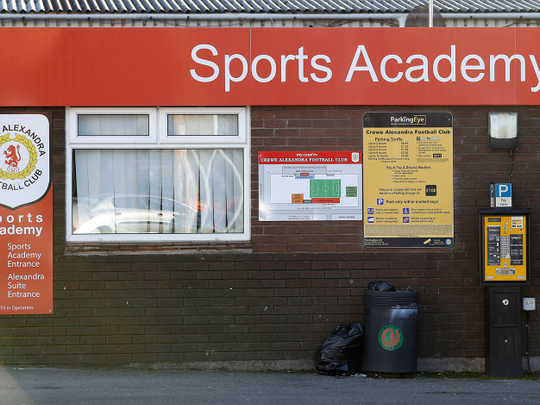
London: More than 860 people have called an English football sex abuse hotline in its first week adding to pressure for action over the crisis that has erupted in the multibillion dollar sport.
Figures released by the National Society for the Prevention of Cruelty to Children (NSPCC) charity on Thursday came after a former Newcastle United player joined the growing list of ex-footballers to reveal they were abused.
Fifteen police forces across Britain are now investigating cases that have made daily headlines in the country over the past two weeks.
The NSPCC helpline, supported by the English Football Association, received 50 calls within two hours of opening last week.
The group said that “Helpline staff also made 60 referrals to police or social services in the first three days.”
That was more than triple the number of referrals made in the first three days of the helpline set up for victims of Jimmy Savile, a serial paedophile and late BBC star presenter.
The Football Association chairman Greg Clarke has pledged to fully investigate claims that clubs suppressed the reporting of child sexual abuse by buying the silence of victims and described the alleged cover-up as “morally repugnant”.
Chelsea announced on Tuesday that they have retained an external law firm to carry out an investigation concerning an individual employed by the club in the 1970s, who is now dead.
It is believed the investigation is connected to allegations of historical sexual abuse amid claims in a national newspaper that the club sanctioned a secret payment to a former youth team footballer who accused the club’s ex-chief scout Eddie Heath of child sexual abuse.
“I find it morally repugnant that people would suppress reporting of crimes against children to protect their reputation,” Clarke said.
“If anyone has behaved improperly, they will be held to account and that information will be released. The FA will not be part of any cover-up. If a club has behaved badly, they will be held to account.”
Clarke also appeared to acknowledge that compensation may be payable to victims after admitting the governing body is facing one of the biggest crises in its history.
When asked to measure the size of the crisis, Clarke, who became chairman of the FA in August, said: “It’s certainly the biggest one I can remember. Institutionally, all organisations in the old days used to protect themselves by keeping quiet and closing ranks. That’s completely inappropriate and unacceptable today.
“It’s appropriate that the FA is in the spotlight here,” he added. “We are the governing body. The criminal investigation takes precedence, because it has to stand up in a court of law and it may take some time. But I don’t think that’s an excuse for the FA to do nothing. We’re doing what we believe we can do today, which is examining the role of the FA, how this information was captured, how it was reported, what decisions were made and when. We will bring information to the public domain as quickly as possible. If the FA looks bad, so be it.”
The scale of the football abuse began to emerge after ex-footballers Andy Woodward, Steve Walters and Paul Stewart revealed last week the abuse they suffered at the hands of youth football coaches.
The hotline is backed by NSPCC ambassador Wayne Rooney, the England captain.
“It’s awful that some of my colleagues have suffered this way whilst playing the sport that I and they love,” he said.
“It’s important that people know that it’s OK to speak out, there is help available and that they don’t need to suffer in silence.”
Convicted molester Barry Bennell has been accused by at least 20 footballers of abusing them when he worked for Crewe Alexandra, Manchester City and Stoke City across three decades beginning in the 1970s.
He is the target of five separate police investigations and on Tuesday was charged with eight counts of child abuse, prosecutors said.
Former Newcastle player David Eatock is the latest player to speak out about his suffering.
Eatock was signed by Newcastle when Kevin Keegan was manager of the northeast club.
Now 40, he said he had been a victim of former youth coach George Ormond, who was sentenced to six years in 2002 for offences committed over almost 25 years.
“One of the more difficult parts for me is that I wasn’t as young as some of the others,” Eatock told the Guardian newspaper.
“I was 18 when I got to know George Ormond. I can still remember the look on his face, how terrifying it was, and how his eyes were possessed.”
He added: “I’m just glad Andy Woodward, by speaking out, has given me the strength to do this because I never would have otherwise. It has been like a knot in my brain and I’m now trying to pick apart that knot.”
According to the Daily Telegraph newspaper, Premier League leaders Chelsea made a secret payment to a former youth team player who accused a talent scout, the late Eddie Heath, of sexually assaulting him during the 1970s.
The sum was given to the unnamed former player on the condition the alleged abuse would not be made public, the newspaper reported, citing a source.
The player went to the club around three years ago and has also spoken to the Metropolitan Police, the newspaper added.
Chelsea have only announced they had retained an external law firm to carry out an investigation.












